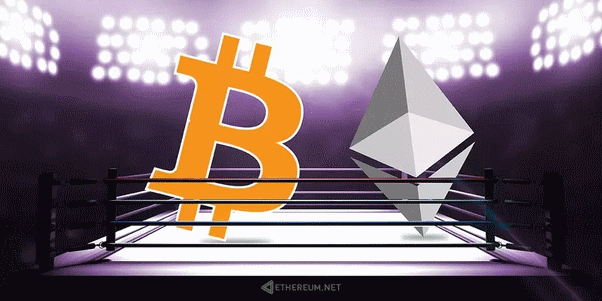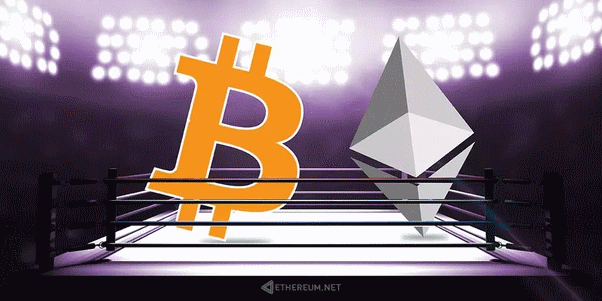
IMAGE SOURCE
Bitcoin is the most popular and crypto protocol, and the standard for the entire crypto economy. In 2021, the competition between bitcoin and ethereum has intensified, as the struggle for cryptocurrency domination heats up.
Both of these leading cryptocurrencies suffered losses last week. Bitcoin’s market cap fell by 12.6%, while ethereum’s market cap fell by 19.3% week over week. However, ethereum, the second-largest cryptocurrency, for the third time in a month has outperformed bitcoin in terms of active addresses. It registered just over 750,000 active addresses on Friday, 50,000 more than bitcoin. Meanwhile, bitcoin’s total number of active addresses has dropped 38% over the last three months.
Active Bitcoin addresses drop 50%
The number of active Bitcoin addresses has fallen by more than 50% in the last month, according to data from CoinMarketCap.com. Several factors could explain the sharp decline, including the sell-off that followed Bitcoin’s all-time highs in May and subsequent sideways market action. There is also a massive drop in network hash rate in the aftermath of China’s latest crackdown on domestic Bitcoin mining operations.
Flippening?
As Wall Street titans and individual investors enter the crypto market, traders are speculating on whether ethereum will continue to outperform bitcoin and if it could ultimately “flip” bitcoin.
Historically ethereum has outperformed bitcoin in terms of active addresses. Ethereum also surpassed bitcoin on June 5th and 6th. While this may indicate that ethereum is coming up to bitcoin, could this be a sign of the fabled “flippening” occurring?
Ethereum’s stunning outperformance of Bitcoin in recent years has prompted speculation about the potential of a “flippening”, an occurrence in which ethereum outperforms bitcoin and becomes the better blockchain. This line of thought inevitably leads to a comparison of these two market leaders in terms of more than simply pricing. However, any such comparison is entirely unfair, given these two networks serve very different and distinct objectives.
JPMorgan predicts ethereum’s transition to proof-of-stake will boost crypto adoption and contribute $40 billion in value by 2025: “Not only does staking lower the opportunity cost of holding cryptocurrencies versus other asset classes, but in many cases, cryptocurrencies pay a significant nominal and real yield,” JPMorgan analysts wrote.
In the last twelve months, the price of ethereum has outperformed bitcoin by a factor of 3x. The non-fungible token (NFT) craze, which has seen all sorts of memes, digital artwork, Axie infinity guide, tweets, and YouTube videos traded via ethereum’s blockchain, has raised ethereum demand even more. Bitcoin is still the most popular currency in the world, but its price has fallen to below for the first time since January.
The Defi boom has also pushed the prices of ethereum rivals such as Cardano, Binance’s BNB, Polkadot, and Solana thousands of percent higher. It comes as ethereum begins its long-awaited transition away from bitcoin’s proof-of-work (PoW) validation model and toward the more energy-efficient proof-of-stake algorithm (PoS).
Factors for ethereum’s meteoric rise:
- Use of smart contracts: These self-executing contracts are one of the reasons that investors such as Mark Cuban adore Ethereum. It’s a computer-coded contract that can automatically execute when specific circumstances are satisfied. Consider an insurance policy that compensated you without requiring you to file a claim. That is only one possible application of this code. Additionally, smart contracts power non-fungible coins (NFTs). Sales of NFTs — digital collectibles — have surged this year, as they provide a revenue stream for digital artists and other producers. Copyright and royalty information is stored in the smart contracts used in NFTs.
- A Defi platform: Because Ethereum is a programmable blockchain, it enables the creation of new currencies and apps on its network. Another blockchain application that has gained traction this year is Decentralized Finance (Defi). This eliminates the requirement for a bank account to borrow, lend, or earn interest on your money. Around 80% of decentralized applications are presently available on the Ethereum network, according to State of the DApps, a database of decentralized applications.
- Eth 2 update: The much-anticipated update to ethereum aims to improve the security, scalability, and environmental friendliness of ethereum. It’s expected that the transition to a more sustainable mining strategy will occur this year.
Bitcoin vs. Ethereum
Flippening may occur one day, but it is not imminent. It is unfair to compare bitcoin with ethereum because do very different things and have very little in common.
Crypto markets are very risky and unpredictably volatile investments. Some experts believe this is a bubble that will burst, but the more pressing concern is what will become of the bitcoin business in its whole.
Bitcoin’s unique selling point as a “store of value” asset is its extremely predictable monetary policy. However, the move to a new method of protecting the ethereum blockchain may make it more secure than bitcoin.
Ethereum money?
Ethereum is an environment that enables anybody to create decentralized applications (Dapps), smart contracts, and even coins on top of the ethereum blockchain. It is not only a coin; it is also a technical environment. Some refer to it as the trendy web 3.0, or third generation of online services. While Ethereum faces competition from other crypto-asset and smart-contract platforms, it has won the battle to become the de facto standard for money and finance digitization.
Contrary to bitcoin, ethereum does not become money by being adopted by countries like El Salvador, it becomes money through the development of its own economy.
Bitcoin is the most popular and crypto protocol, and the standard for the entire crypto economy. In 2021, the competition between bitcoin and ethereum has intensified, as the struggle for cryptocurrency domination heats up.
Both of these leading cryptocurrencies suffered losses last week. Bitcoin’s market cap fell by 12.6%, while ethereum’s market cap fell by 19.3% week over week. However, ethereum, the second-largest cryptocurrency, for the third time in a month has outperformed bitcoin in terms of active addresses. It registered just over 750,000 active addresses on Friday, 50,000 more than bitcoin. Meanwhile, bitcoin’s total number of active addresses has dropped 38% over the last three months.
Active Bitcoin addresses drop 50%
The number of active Bitcoin addresses has fallen by more than 50% in the last month, according to data from CoinMarketCap.com. Several factors could explain the sharp decline, including the sell-off that followed Bitcoin’s all-time highs in May and subsequent sideways market action. There is also a massive drop in network hash rate in the aftermath of China’s latest crackdown on domestic Bitcoin mining operations.
Flippening?
As Wall Street titans and individual investors enter the crypto market, traders are speculating on whether ethereum will continue to outperform bitcoin and if it could ultimately “flip” bitcoin.
Historically ethereum has outperformed bitcoin in terms of active addresses. Ethereum also surpassed bitcoin on June 5th and 6th. While this may indicate that ethereum is coming up to bitcoin, could this be a sign of the fabled “flippening” occurring?
Ethereum’s stunning outperformance of Bitcoin in recent years has prompted speculation about the potential of a “flippening”, an occurrence in which ethereum outperforms bitcoin and becomes the better blockchain. This line of thought inevitably leads to a comparison of these two market leaders in terms of more than simply pricing. However, any such comparison is entirely unfair, given these two networks serve very different and distinct objectives.
JPMorgan predicts ethereum’s transition to proof-of-stake will boost crypto adoption and contribute $40 billion in value by 2025: “Not only does staking lower the opportunity cost of holding cryptocurrencies versus other asset classes, but in many cases, cryptocurrencies pay a significant nominal and real yield,” JPMorgan analysts wrote.
In the last twelve months, the price of ethereum has outperformed bitcoin by a factor of 3x. The non-fungible token (NFT) craze, which has seen all sorts of memes, digital artwork, Axie infinity guide, tweets, and YouTube videos traded via ethereum’s blockchain, has raised ethereum demand even more. Bitcoin is still the most popular currency in the world, but its price has fallen to below for the first time since January.
The Defi boom has also pushed the prices of ethereum rivals such as Cardano, Binance’s BNB, Polkadot, and Solana thousands of percent higher. It comes as ethereum begins its long-awaited transition away from bitcoin’s proof-of-work (PoW) validation model and toward the more energy-efficient proof-of-stake algorithm (PoS).
Factors for ethereum’s meteoric rise:
- Use of smart contracts: These self-executing contracts are one of the reasons that investors such as Mark Cuban adore Ethereum. It’s a computer-coded contract that can automatically execute when specific circumstances are satisfied. Consider an insurance policy that compensated you without requiring you to file a claim. That is only one possible application of this code. Additionally, smart contracts power non-fungible coins (NFTs). Sales of NFTs — digital collectibles — have surged this year, as they provide a revenue stream for digital artists and other producers. Copyright and royalty information is stored in the smart contracts used in NFTs.
- A Defi platform: Because Ethereum is a programmable blockchain, it enables the creation of new currencies and apps on its network. Another blockchain application that has gained traction this year is Decentralized Finance (Defi). This eliminates the requirement for a bank account to borrow, lend, or earn interest on your money. Around 80% of decentralized applications are presently available on the Ethereum network, according to State of the DApps, a database of decentralized applications.
- Eth 2 update: The much-anticipated update to ethereum aims to improve the security, scalability, and environmental friendliness of ethereum. It’s expected that the transition to a more sustainable mining strategy will occur this year.
Bitcoin vs. Ethereum
Flippening may occur one day, but it is not imminent. It is unfair to compare bitcoin with ethereum because do very different things and have very little in common.
Crypto markets are very risky and unpredictably volatile investments. Some experts believe this is a bubble that will burst, but the more pressing concern is what will become of the bitcoin business in its whole.
Bitcoin’s unique selling point as a “store of value” asset is its extremely predictable monetary policy. However, the move to a new method of protecting the ethereum blockchain may make it more secure than bitcoin.
Ethereum money?
Ethereum is an environment that enables anybody to create decentralized applications (Dapps), smart contracts, and even coins on top of the ethereum blockchain. It is not only a coin; it is also a technical environment. Some refer to it as the trendy web 3.0, or third generation of online services. While Ethereum faces competition from other crypto-asset and smart-contract platforms, it has won the battle to become the de facto standard for money and finance digitization.
Contrary to bitcoin, ethereum does not become money by being adopted by countries like El Salvador, it becomes money through the development of its own economy.

Ilias Louis Hatzis
Ilias Louis Hatzis is the Founder & CEO at Mercato Blockchain Corporation AG.
Ilias Louis Hatzis is the founder and CEO at Kryptonio wallet. Create your wallet in less than a minute, without seed phrases, private keys, passwords or documents. Keep your bitcoin and digital assets always secure and recoverable: https://kryptonio.com
I have no positions or commercial relationships with the companies or people mentioned. I am not receiving compensation for this post.
Ilias Louis Hatzis is the founder and CEO at Kryptonio wallet. Create your wallet in less than a minute, without seed phrases, private keys, passwords or documents. Keep your bitcoin and digital assets always secure and recoverable: https://kryptonio.com
I have no positions or commercial relationships with the companies or people mentioned. I am not receiving compensation for this post.
Autres articles
-
Revolut obtient une licence bancaire au Royaume-Uni
-
Nominations | Eight Advisory annonce deux nouveaux associés en France
-
NFT : L'Opéra de Paris dévoilera à la rentrée une nouvelle collection d'art numérique
-
WEB3 : L'Europe, le baby-blues des licornes ?
-
Finyear, partenaire média de la prochaine édition de l'IPEM Paris
















